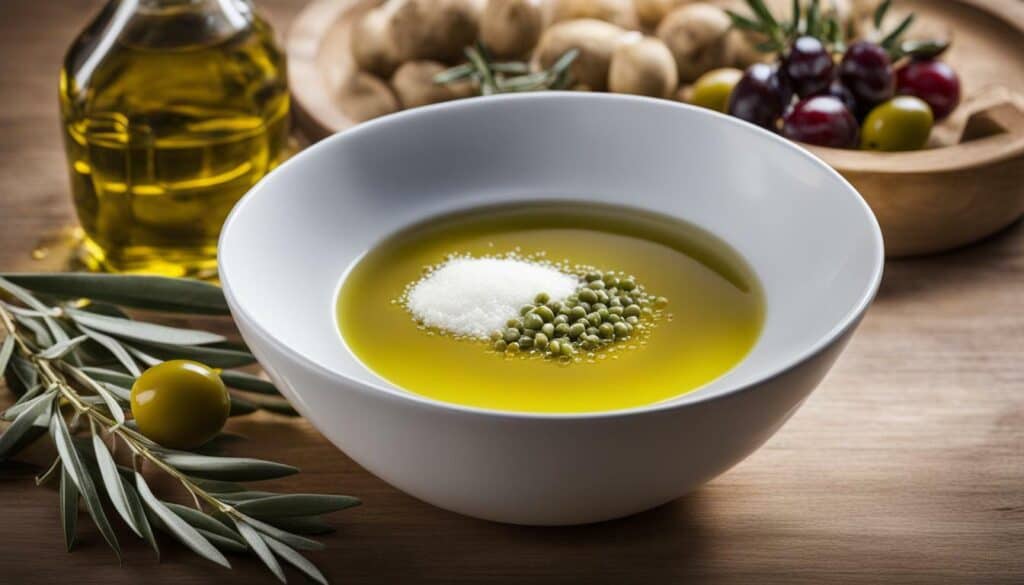Have you ever wondered how many calories are in vinegar and oil? In this article, I will delve into the calorie content of these pantry staples, giving you the facts you need to make informed choices for a healthier lifestyle.
Key Takeaways:
- Vinegar is low in calories, with approximately 3.2 calories per one tablespoon serving.
- Different types of vinegar may have slightly different calorie counts.
- Oil is higher in calories, with extra virgin olive oil containing approximately 119 calories per one tablespoon serving.
- Oil and vinegar dressing can be a healthy choice for salads when used in moderation.
- Vinegar has been linked to potential weight loss benefits, although more research is needed.
Understanding Vinegar’s Calorie Content
When it comes to calories, vinegar is a low-calorie option. With approximately 3.2 calories per one tablespoon serving, it is a great choice for those watching their calorie intake. Not only is vinegar low in calories, but it also does not contain any fat or protein, making it a light and refreshing addition to meals.
It’s important to note that different types of vinegar may have slightly different calorie counts. For example, apple cider vinegar and white vinegar, two popular varieties, may vary in their calorie content. To get the most accurate information, it’s always a good idea to check the nutrition label or use reliable sources to determine the calorie count of the specific vinegar you are using.

Aside from being low in calories, vinegar also offers some health benefits. It has been associated with potential weight loss benefits and may aid in digestion. However, it’s important to note that vinegar does not directly cause weight gain. Incorporating vinegar into your diet can be a part of a balanced approach to weight management.
Benefits of Vinegar:
- Potential weight loss benefits
- May aid in digestion
- Low in calories
In conclusion, vinegar is a low-calorie option that can add flavor to your meals without adding significant calories. Whether you’re using it as a salad dressing or a marinade, be sure to use it in moderation for optimal results. So go ahead, embrace the tangy goodness of vinegar and enjoy its health benefits as part of a balanced diet!
Variations in Vinegar’s Calorie Count
Not all vinegars are created equal when it comes to calories. Different types of vinegar may have slightly different calorie counts. Let’s take a look at some popular varieties like apple cider vinegar and white vinegar.
Apple cider vinegar is a widely used vinegar known for its health benefits. It has a slightly sweet and tangy flavor, making it a popular choice for dressings and marinades. When it comes to calories, apple cider vinegar contains approximately 3.2 calories per one tablespoon serving. It is low in calories, making it a great option for those watching their calorie intake.
White vinegar, on the other hand, is known for its sharp, acidic taste. It is commonly used in cooking, cleaning, and pickling. White vinegar also contains approximately 3.2 calories per one tablespoon serving, similar to apple cider vinegar. Both types of vinegar provide flavor to dishes without significantly contributing to the overall calorie count.
To better understand the calorie count of other types of vinegar, it is recommended to check the nutrition label or seek information from reputable sources. It’s important to note that while vinegar is low in calories, it primarily adds flavor rather than significant nutritional value to meals. However, vinegar can still be a part of a balanced diet for those looking to manage their calorie intake.
| Vinegar Type | Calories |
|---|---|
| Apple Cider Vinegar | 3.2 |
| White Vinegar | 3.2 |
The Calorie Content of Oil
While vinegar is low in calories, oil packs a higher calorie punch. It’s important to be mindful of the calorie content of oil, especially if you’re watching your intake. In general, oils are high in calories because they are a concentrated source of fat. One tablespoon of oil, such as extra virgin olive oil, contains approximately 119 calories. However, the exact calorie count may vary depending on the specific type of oil used. It’s always a good idea to check the nutrition label for accurate information.
When using oil in cooking or dressing, it’s important to remember that a little goes a long way. Instead of pouring oil directly from the bottle, try using a measuring spoon or sprayer to control the amount you use. This can help you keep track of your calorie intake and prevent overconsumption. Additionally, consider opting for healthier oils like olive oil or avocado oil, which contain monounsaturated fats that are beneficial for heart health.
| Type of Oil | Calorie Content per 1 tbsp |
|---|---|
| Olive Oil | 119 calories |
| Canola Oil | 124 calories |
| Coconut Oil | 121 calories |
“Using a moderate amount of oil in your cooking can add flavor and texture to your dishes. Just be mindful of the calorie content and opt for healthier options.”
By being aware of the calorie content of oil and using it in moderation, you can still enjoy the benefits it brings to your culinary creations. Remember to balance your oil intake with other nutritious ingredients and incorporate a variety of foods into your diet for overall health and well-being.
Incorporating Oil into a Balanced Diet
Oil is not just a source of calories; it also provides essential fatty acids and fat-soluble vitamins. It’s important to incorporate oil into a balanced diet to ensure you’re getting these necessary nutrients. Here are some ways to incorporate oil in a healthy manner:
- Use oil as a dressing for salads, but be mindful of portion sizes.
- Add a small amount of oil when sautéing vegetables or cooking lean protein.
- Drizzle a little oil over roasted or grilled vegetables for added flavor.
Remember, oil is just one component of a healthy diet. It’s important to consume a variety of foods, including fruits, vegetables, whole grains, lean proteins, and dairy or dairy alternatives. By incorporating oil in moderation and choosing healthier options, you can enjoy its benefits while maintaining a well-balanced and nutritious eating plan.

Table 1: Calorie content of different types of oil per 1 tablespoon serving.
Types of Oil and Their Calorie Counts
It’s important to be aware of the calories present in different types of oil. The calorie content of oil can vary depending on the type used. Let’s take a closer look at some commonly used oils and their calorie counts.
| Oil Type | Calories per 1 tablespoon serving |
|---|---|
| Extra Virgin Olive Oil | 119 |
| Canola Oil | 124 |
| Coconut Oil | 117 |
| Avocado Oil | 124 |
As you can see, the calorie count can vary slightly between different oils. It’s important to note that these values are approximate and can differ depending on the brand and processing methods. When incorporating oil into your meals, it’s essential to consider the calorie content and practice portion control.
Using an appropriate amount of oil can enhance the flavor of your dishes while providing essential fats. However, it’s crucial to use it in moderation to avoid excessive calorie intake. Remember, even healthy fats should be consumed in proper portions to maintain a balanced diet.
In addition to counting calories, it’s essential to consider the overall nutritional value of oils. Each type of oil offers unique benefits and can be a valuable addition to your diet. For example, extra virgin olive oil is known for its heart-healthy monounsaturated fats, while coconut oil contains medium-chain triglycerides that can potentially boost metabolism.
By understanding the calorie content and nutritional value of different oils, you can make informed choices that align with your dietary needs and goals. Remember, moderation is key, and incorporating a variety of oils into your meals can help you achieve a balanced and enjoyable eating experience.
Summing It Up
- Different types of oil have varying calorie counts per tablespoon serving.
- Popular oils like extra virgin olive oil, canola oil, coconut oil, and avocado oil all have different calorie contents.
- Calorie counts can vary based on factors such as brand and processing methods.
- Moderation is important when using oil in your meals to control calorie intake.
- Consider the overall nutritional value of oils and choose a variety of options for a balanced diet.
Remember, understanding the calorie content and nutritional value of oils can help you make informed choices for a healthier lifestyle.
Using Oil and Vinegar Dressing Moderately
If you enjoy oil and vinegar dressing, there’s good news for you. Not only does it provide a burst of flavor to your salads, but it can also offer some health benefits. However, it’s important to use this dressing in moderation to maintain a balanced diet.
Vinegar, which is low in calories and contains no fat or protein, can be a great addition to your salads. With approximately 3.2 calories per one tablespoon serving, it adds tanginess without adding excessive calories. Different types of vinegar, such as apple cider vinegar and white vinegar, may have slightly different calorie counts, so it’s always good to check the label.
On the other hand, oil is higher in calories compared to vinegar. Extra virgin olive oil, a commonly used option, contains approximately 119 calories per one tablespoon serving. The specific type of oil you choose can affect the calorie count. To be certain, it’s best to refer to the nutrition label of the oil you are using. Remember, while oil does provide some health benefits, it’s important to use it in moderation to avoid consuming excessive calories.
To summarize, oil and vinegar dressing can be a tasty and healthy addition to your salads. Just remember to use it in moderation, as it can contribute to your overall calorie intake. So go ahead and drizzle some oil and vinegar on your greens, but keep portion sizes in mind. Enjoy the flavors and the health benefits they offer, and maintain a well-balanced diet.

Can vinegar help you shed those extra pounds? Let’s explore the potential weight loss benefits of vinegar. While more research is needed, some studies suggest that vinegar may have a positive impact on weight management.
One study published in the journal Bioscience, Biotechnology, and Biochemistry found that participants who consumed vinegar with a high-carbohydrate meal experienced reduced appetite and increased feelings of fullness compared to those who did not consume vinegar. This could potentially lead to consuming fewer calories throughout the day, aiding in weight loss.
Another study published in the European Journal of Clinical Nutrition showed that vinegar consumption was associated with decreased body weight, body mass index (BMI), waist circumference, and body fat percentage in obese participants. However, it’s important to note that these findings may not necessarily translate to significant weight loss for individuals who are not obese.
| Vinegar Type | Calories per 1 tbsp |
|---|---|
| Apple Cider Vinegar | 3 |
| White Vinegar | 4 |
It’s worth mentioning that while vinegar may have potential weight loss benefits, it is not a magic solution. It is best to incorporate vinegar into a balanced diet that includes regular exercise and other healthy lifestyle habits. Additionally, moderation is key when consuming vinegar, as excessive amounts can have negative effects on digestion and tooth enamel.
Conclusion
In conclusion, vinegar may offer potential weight management benefits due to its impact on appetite and feelings of fullness. However, it’s important to remember that vinegar should be used as part of a comprehensive approach to weight loss, which includes a balanced diet and regular exercise. Consult with a healthcare professional or registered dietitian for personalized advice on incorporating vinegar into your diet.
Vinegar’s Impact on Weight Gain
Worried that vinegar may contribute to weight gain? Don’t be. When it comes to the calorie content of vinegar, it’s important to note that vinegar is low in calories, with approximately 3.2 calories per one tablespoon serving. Not only is vinegar low in calories, but it also does not contain any fat or protein. This makes it a great option for those looking to reduce their calorie intake while still adding flavor to their meals.
Different types of vinegar, such as apple cider vinegar and white vinegar, may have slightly different calorie counts. However, the overall calorie content remains relatively low. So, whether you prefer the tangy taste of apple cider vinegar or the versatility of white vinegar, you can enjoy them without worrying about their impact on weight gain.
It’s important to understand that vinegar does not directly cause weight gain. In fact, vinegar has been associated with potential weight loss benefits. Some studies suggest that vinegar may help regulate blood sugar levels and promote feelings of fullness, which can aid in weight management. However, more research is needed to fully understand the relationship between vinegar and weight loss.

| Vinegar Type | Calories per Tablespoon |
|---|---|
| White Vinegar | 3.2 |
| Apple Cider Vinegar | 3 |
While vinegar’s impact on weight gain may be minimal, it’s important to remember that it should be incorporated into a balanced diet. Vinegar alone cannot guarantee weight loss or maintenance. It’s always best to combine vinegar with other healthy lifestyle choices, such as regular exercise and a well-rounded diet, to achieve optimal results.
Vinegar and Metabolism
Can vinegar give your metabolism a boost? While there are claims that vinegar can increase metabolism and aid in weight loss, the evidence is limited. Some studies suggest that vinegar may have a small impact on metabolism, but it is not significant enough to rely on as a sole weight loss solution.
Researchers believe that acetic acid, a compound found in vinegar, may play a role in metabolism regulation. However, the effect is likely to be minimal and may vary between individuals.
It’s important to note that there are no quick fixes when it comes to boosting metabolism. A healthy lifestyle, which includes regular exercise, a balanced diet, and adequate sleep, is essential for maintaining a healthy metabolism.

| Vinegar Type | Calories per 1 tablespoon |
|---|---|
| Apple Cider Vinegar | 3 |
| White Vinegar | 3 |
Takeaway: While vinegar may have some potential health benefits, such as weight loss and metabolism regulation, it should not be relied upon as a miracle solution. Incorporating vinegar into a balanced diet, alongside other healthy habits, can contribute to overall well-being.
Incorporating Vinegar into a Balanced Diet
Vinegar can be more than just a low-calorie condiment. It can add a burst of flavor to your meals while also offering some potential health benefits. When used in moderation, vinegar can be a versatile ingredient that enhances the taste of salads, marinades, and dressings. Let’s explore how you can incorporate vinegar into a balanced diet and make the most of its nutritional properties.
The Benefits of Vinegar:
Vinegar, especially apple cider vinegar, has been associated with potential health benefits such as supporting digestion, managing blood sugar levels, and aiding in weight management. It contains acetic acid, which may help to control appetite and promote feelings of fullness. However, it’s important to note that more research is needed to fully understand these effects.
Delicious Ways to Use Vinegar:
There are numerous ways to incorporate vinegar into your daily meals. You can use it as a salad dressing by combining it with olive oil, herbs, and spices. This simple dressing can add flavor to your greens without piling on excess calories. Additionally, vinegar can be used as a marinade for meats and vegetables, providing a tangy and tenderizing effect. You can even add a splash of vinegar to soups, stews, and stir-fries for an extra layer of taste.
And don’t forget about pickles! Pickling vegetables in vinegar not only extends their shelf life but also adds a zesty, sour taste that can complement a variety of dishes. With so many options available, vinegar can truly be a versatile ingredient in your kitchen.
| Type of Vinegar | Calories (per 1 tablespoon serving) |
|---|---|
| Apple Cider Vinegar | 3 |
| White Vinegar | 3 |
| Balsamic Vinegar | 14 |
| Red Wine Vinegar | 3 |
Integrating Vinegar into Your Healthy Lifestyle:
While vinegar can provide flavor and potential health benefits, it’s essential to use it in moderation. Remember that vinegar is acidic, so consuming excessive amounts may have negative effects on your digestive system. Additionally, if you have any underlying health conditions or take medication, it’s always best to consult with a healthcare professional before making any significant changes to your diet.
By incorporating vinegar into a balanced diet, you can enjoy its tangy taste while benefiting from its potential health properties. Whether you prefer it in dressings, marinades, or pickled foods, vinegar can be a delightful addition to your culinary repertoire. Embrace its versatility and savor the flavor it brings to your meals.
The Importance of Moderation
Remember, even with its low-calorie count, moderation is still important when it comes to incorporating vinegar and oil into your diet. While vinegar is known for its tangy flavor and health benefits, it is essential to use it in moderation to maintain a balanced intake of calories. One tablespoon of vinegar contains approximately 3.2 calories and does not contain any fat or protein. Different types of vinegar, such as apple cider vinegar and white vinegar, may have slightly different calorie counts, so it’s worth checking the nutrition label for accurate information.
On the other hand, oil is higher in calories compared to vinegar. One tablespoon of extra virgin olive oil, a commonly used option, contains approximately 119 calories. Keep in mind that the specific type of oil used can affect the calorie count, so it’s always a good idea to check the nutrition label for accurate information. Oil and vinegar dressing can be a healthy choice for salads when used in moderation, as they provide flavor and some health benefits.
However, it’s important to note that vinegar alone does not directly cause weight gain. While vinegar has been associated with potential weight loss benefits, more research is needed to fully understand its effects. Additionally, vinegar does not raise metabolism in a significant way. It’s best to view vinegar as part of a balanced diet rather than relying on it as a sole weight loss solution. Remember, a healthy lifestyle is all about moderation and making informed choices.

| Vinegar Type | Calories per Tablespoon |
|---|---|
| Apple Cider Vinegar | 3.2 |
| White Vinegar | 3.2 |
Table Note: The calorie content is approximate and may vary slightly between different brands and varieties of vinegar.
To summarize, vinegar is low in calories and can be a healthy addition to your diet. It is important to use it in moderation, just like any other food or ingredient. Oil, on the other hand, is higher in calories, so it’s essential to be mindful of portion sizes. Incorporating vinegar and oil into a balanced diet can provide flavor and potential health benefits, but remember to enjoy them in moderation and consider your overall calorie intake to maintain a healthy lifestyle.
Conclusion
Armed with the facts, you can now make healthier choices with vinegar and oil. When it comes to the calorie content of vinegar and oil, it’s important to note that vinegar is low in calories, with approximately 3.2 calories per one tablespoon serving. It contains no fat or protein, making it a great option for those watching their calorie intake. However, different types of vinegar may have slightly different calorie counts, so it’s always a good idea to check the nutrition label.
On the other hand, oil is higher in calories, with extra virgin olive oil containing approximately 119 calories per one tablespoon serving. The specific type of oil used can affect the calorie count, so it’s important to be mindful of portion sizes. Oil and vinegar dressing can be a healthy choice for salads when used in moderation, as they provide flavor and some health benefits.
While vinegar has been linked to potential weight loss benefits, more research is needed to fully understand its effects. It’s important to note that vinegar does not directly cause weight gain. Additionally, vinegar does not significantly raise metabolism. Therefore, it is best to view vinegar as a part of a balanced diet rather than a sole weight loss solution.
Armed with this knowledge, you can now enjoy the benefits of vinegar and oil while making informed choices for a healthier lifestyle. Remember to use vinegar and oil in moderation, and embrace the flavor they bring to your meals. Here’s to a delicious and nutritious journey!
FAQ
Q: Is vinegar low in calories?
A: Yes, vinegar is low in calories, with approximately 3.2 calories per one tablespoon serving.
Q: Does vinegar contain fat or protein?
A: No, vinegar does not contain any fat or protein.
Q: Do different types of vinegar have different calorie counts?
A: Yes, different types of vinegar, such as apple cider vinegar and white vinegar, may have slightly different calorie counts.
Q: How many calories does oil have?
A: Oil is higher in calories, with extra virgin olive oil containing approximately 119 calories per one tablespoon serving.
Q: Does the type of oil affect the calorie count?
A: Yes, the specific type of oil used can affect the calorie count. It is best to check the nutrition label.
Q: Can oil and vinegar dressing be a healthy choice for salads?
A: Yes, oil and vinegar dressing can be a healthy choice for salads when used in moderation, as they provide flavor and some health benefits.
Q: Is vinegar linked to potential weight loss benefits?
A: Yes, vinegar has been linked to potential weight loss benefits, although more research is needed.
Q: Does vinegar directly cause weight gain?
A: No, vinegar does not directly cause weight gain. It can be a part of a balanced diet and weight management.
Q: Does vinegar raise metabolism significantly?
A: No, vinegar does not raise metabolism in a significant way.
Q: Can vinegar be incorporated into a balanced diet?
A: Yes, vinegar can be a part of a balanced diet and provide potential health benefits beyond its calorie content.
Q: What is the importance of using vinegar and oil in moderation?
A: It is important to use vinegar and oil in moderation for a healthy lifestyle.
How Many Calories are in a Beef Sausage Compared to Vinegar and Oil?
When comparing the calories in beef sausage uncovered to vinegar and oil, there is a significant difference. A beef sausage typically contains a higher calorie content due to its protein and fat content. On the other hand, vinegar and oil have considerably fewer calories, making them a healthier option for those watching their calorie intake.





Leave a Reply